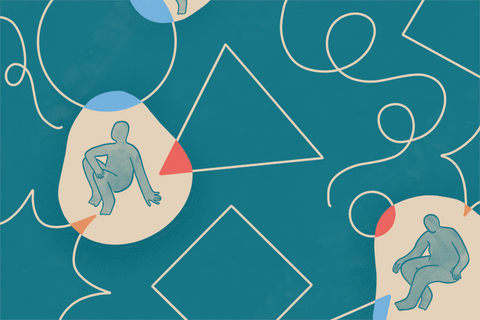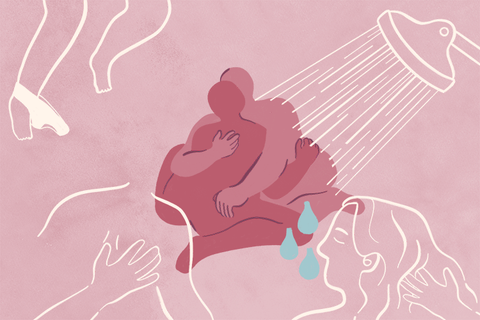Here’s what you can do if you feel your mental health is affecting your sex life
The last twelve months have been...well, pretty stressful.
Between financial insecurity, big changes to the education system, and the global pandemic, many of us are feeling on edge.
A recent study found that, as a result of the recent COVID-19 lockdowns in Australia, one in two younger people are feeling isolated and more than half of us are feeling stressed.
But many people have been experiencing mental health issues for much longer: according to Beyond Blue, one in six Australians has anxiety, depression, or both; and one in eight Australians are experiencing high or very high psychological distress.
We know that mental illness is common, but that doesn’t make it any easier to deal with when it happens to us. And when we’re going through a rough time with our mental health, the last thing we probably want to do is think about our sex lives.
But that’s exactly what we’re going to talk about now: mental health, and how it can impact our sexuality.
Sometimes being intimate with ourselves or our partners can be a healing and soothing moment in the middle of a mental health storm—and other times, a big change in our sex lives can be the our first warning sign that something might be up with our mental health.
Before we get started, we want to provide you with a few numbers you can call if you’re currently struggling with your mental health and need someone to talk to.
These services are all free and confidential, and they can provide really good help—heaps of people use them, and we want you to use them as well if you need to.
Lifeline: 13 11 14
Beyond Blue: 1300 22 4636
National Suicide Callback Service: 1300 659 467
How to tell if you’re struggling with your mental health
Many people struggle with their mental health, and many have diagnosed mental illnesses. This isn’t anything to be ashamed of or to be embarrassed about, it’s just a part of life!
But how can we tell if we’re just having an ‘off day’ or if there’s something more going on? What’s the difference between feeling down or nervous, and being depressed or anxious?
It’s different for everyone, and we don’t want you to use this guide as a hard-and-fast rule. B
ut if you or someone close to you is experiencing any of the following things, which are also listed on the Health Direct website, it might be time to speak with someone like a GP or a counsellor.
- Feeling anxious or worried
- Feeling sad and unhappy
- Being unable to control your emotions
- Sleeping too much or not enough
- Fluctuating weight, or appetite changes
- Losing interest in things you used to enjoy, and becoming withdrawn
- Drinking or using drugs more than usual
- Feeling guilty or worthless
- Changes in behaviour and emotion
Over time, unaddressed mental health conditions can negatively affect our lives. The symptoms of mental illness can be hard to deal with and can prevent us from doing the things we love.
We really encourage you to seek help if you’re struggling with your mental health; and our mates at Kin have written an excellent guide to seeking mental health help that we recommend you read.
How can mental health impact my sex life?
If you’re living with mental illness, having a mental health issue, or if you have in the past, you might’ve noticed it can have some pretty big impacts on your sex life.
If we’re feeling depressed or low, we might notice our libido decreases and we lose interest in having sex.
We could also develop negative feelings around our bodies and physical selves, which could make us avoid intimacy and sex even when we desire it.
On the other hand, mental health can sometimes lead us to make riskier decisions than normal.
Doing things that are out-of-character for you, like not using contraception or using drugs or alcohol before sex, could indicate a deeper issue.
Our mental health can also affect the way our bodies respond to sexual stimulation.
Conditions like anxiety and depression can cause temporary erectile dysfunction, but they can affect anyone of any gender.
Women and people with vaginas may notice their mental health impacts their sexual response as well and makes it difficult to get as aroused, as wet, or as responsive.
These reactions can be true for all people, and aren’t limited by gender: it’s really common for people experiencing mental health issues to notice their physical and sexual responses changing.
Can mental health treatments impact my sex life?
Mental illness can’t always be cured, but it can always be treated, managed, and helped.
One really common treatment for mental illness and mental health conditions is therapy, and there are many different kinds of therapy available. Counselling, group therapy, and CBT (cognitive behaviour therapy) are among the options that may be available to you.
Medications are also sometimes prescribed, with antidepressants and mood stabilisers among the most common.
Treatments like these aren’t only prescribed to people who have a diagnosed mental illness: counselling and therapy, for example, can be really helpful to people who have experienced an upsetting or traumatic event in their lives.
Along with these treatments, you may also be recommended to make some lifestyle changes or practise mindfulness techniques.
While all of these treatments are effective, and all are worth looking in to to see if they’re right for you, some of them can have their own impact on your sex life.
Medications in particular can reduce your ability to get aroused, stay aroused, and have an orgasm. Some medications are particularly well-known for this.
Although these side effects aren’t permanent and almost always go away after you stop taking the medication, it’s important to know about any potential side-effects before you begin taking a medication.
We recommend regularly checking in with your doctor if you’re prescribed medication for a mental health condition, and letting them know how you’re going on it.
You should never stop taking medication you’ve been prescribed for a mental health condition without checking in with your doctor first—but you should be honest with them if the side effects are becoming too unpleasant to tolerate.
For when you’re still craving intimacy…
If you’re not in the mood for sex but are still craving intimacy with your partner, there are a lot of things you can do.
Here are a few of our suggestions, but we encourage you and your partner to come up with your own as well!
- Give each other relaxing massages
- Cuddle in bed together, or on the couch
- Touch each other throughout the day: hold hands, stroke each other’s hair, or kiss each other’s cheek
- Do a low-impact physical activity together, like yoga, walking, or stretching
- Make time to have long talks and conversations with each other
- Find something that will make you both laugh, even if it’s a silly comedy film or some daggy jokes
- Establish regular ‘check-in’ times if you live apart
- Explore other forms of sexual connection like kissing, touching, and oral sex
What to do next, and how to find the right GP
Mental health issues can be awful to deal with, but help is available. A GP should be your first point of contact.
They will ask you some questions about the way you’re feeling, develop a mental health treatment plan for you, and refer you on to a mental health practitioner who specialises in the concern you have.
Beyond Blue has an excellent directory of GPs, social workers, psychologists and more that we highly encourage you to check out.
If you don’t currently have a GP you feel comfortable discussing your mental health with, you may be able to find one there.
We also encourage you to reach out to family, friends, and your partner where possible.
If your mental health is affecting the sex you’re having, or the way you feel about your body or sexuality, your partner may want to know so they can offer you support.
When we struggle with our mental health we can feel isolated and alone—and having people around us to lift us up can make a huge difference.
To learn more about the foundations of great sex with acclaimed sex coach Georgia Grace, check out NORMAL's video masterclass, The Modern Guide To Sex.






